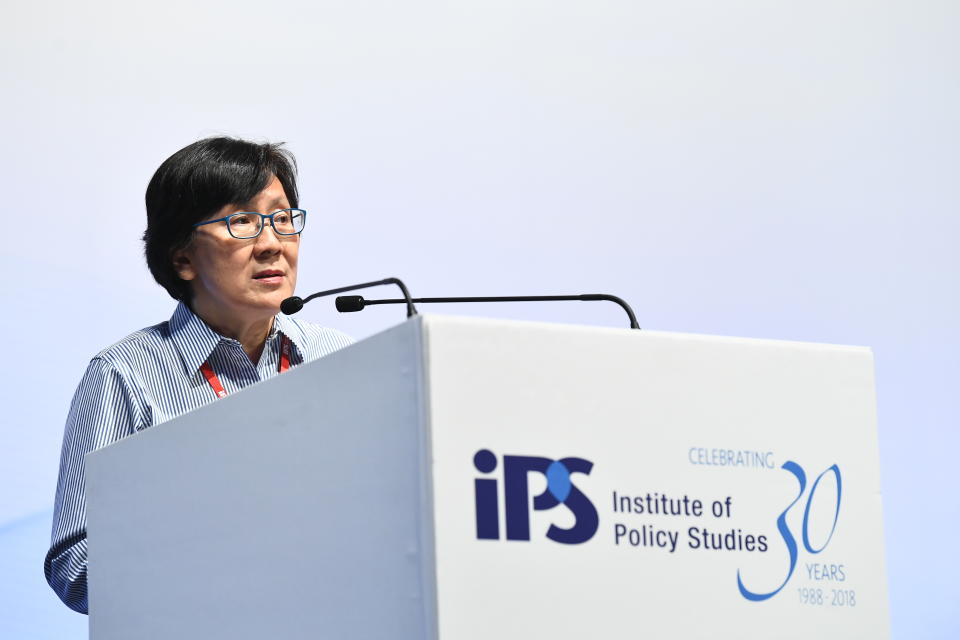Societal consensus on LGBT issues takes time to evolve: Desmond Lee

Societal consensus on the LGBT (lesbian, gay, bisexual, transgender) issues takes time to evolve as they are deeply fraught and reflect Singaporeans’ innermost values and emotions.
This is the view of a panel discussing emerging forms of social identities and social formation at the Institute of Policy Studies 30th Anniversary conference at Marina Bay Sands on Friday (26 October), amid the ongoing debate on Section 377A of the Penal Code. Section 377A criminalises sex between men although the Singapore government has said it is not actively enforced.
Among the panellists was Minister for Social and Family Development and Second Minister for National Development Desmond Lee, who said that social undercurrents make the issue of Section 377A far wider than merely a legal argument.
The larger picture is one of different segments having contrasting views of how Singapore society would evolve, he said.
“One group, a large group, believe that the traditional family structure, of man and woman procreating, is a structure that has served us well, and we should continue to enable them.
“But then you have people with an alternative approach, where their vision of the future of the society is one that you can have marriages of a different form, such as between two men or two women, or having a society where marriage is no longer so important.
“To the majority, they see (Section 377A) as a signpost of moral values, a structure of the norm. But to those who feel a need for inclusiveness for persons with LGBT orientation, they see this as an important gate to be passed in order for their vision of society to evolve.”
‘Change takes time’
The other panellist, sociology professor Paulin Tay Straughan from the Singapore Management University, believes that the repealing of Section 377A is an issue that the community has to deal with carefully. People have to learn how to embrace diversity and accept that change takes time.

She suggests that it is important for parents to feel that their children are free from any social stigmatisation with regard to sexual orientation, and that the community should offer safe spaces for people with different sexual orientations.
More diversity in Singapore society
The LGBT issue is just one of the many facets of Singapore’s changing societal landscape which its people have to navigate. Singapore is also becoming more diversified in areas such as race and nationality, Lee said.
For example, he cited the statistic that inter-ethnic marriages have increased from 16 per cent of total marriages in 2007 to 22 per cent in 2017. Meanwhile, trans-national marriages accounted for more than one-third (35 per cent) of total marriages in 2017.
The challenge is not to let division prevail in an environment of increasing diversity, especially in sensitive areas like religion and class.
Lee said, “We need the community to provide active and proactive counterweights, so the government is partnering the community to create more spaces, more platforms for people of different backgrounds to come together.”
‘Conversation on LGBT issue must continue’
Going back to the LGBT issue, Lee believes that Singapore society has already changed in its attitudes towards people of different sexual orientations.
He said, “If you cast yourself back 20 years ago, people spoke about (the LGBT issue) in whispers. Today we are speaking about it openly. Today 377A is not actively enforced. Every year we have the Pink Dot event which many Singaporeans attend, supported by Singapore businesses. Today you have gay bars, gay entertainment outlets who operate without having to worry about being open. So let’s accept that Singapore society has changed over the decades.”
Calling for the conversation on 377A to continue, Lee urged Singaporeans to be respectful in their debates on the issue so that they can strive towards a consensus about the future of Singapore society.
“We want to see ourselves in a broader circle, that however diverse our viewpoints are, we are still one society.”
Related stories:
Not yet practical to implement minimum wage in Singapore: Josephine Teo
Singapore has to keep the ‘escalator’ of social mobility moving up: DPM Tharman
K Shanmugam answers queries on Section 377A by church leaders at briefing



